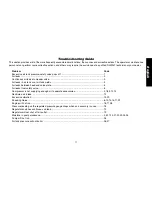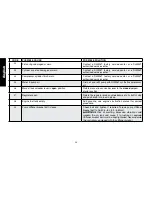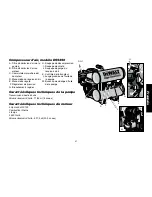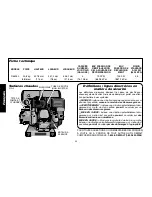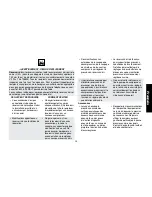
10
E
n
g
li
sh
AIr tAnk Pressure GAuGe
The air tank pressure gauge (D) indicates
D
F
E
G
air pressure in the air tank.
reGulAteD Pressure GAuGe
The regulated pressure gauge (E) indicates
the air pressure available at the outlet side
of the regulator. This pressure is controlled
by the regulator and is always less or equal
to the air tank pressure.
reGulAtor
The regulator knob (F) controls the air pressure coming from the air
tank.
Adjusting regulator
1. Pull regulator knob (F) out.
. Turn knob clockwise to increase regulated pressure and
counterclockwise to decrease regulated pressure.
3. When desired pressure is shown on the regulated pressure
gauge push knob in to lock.
tHrottle Control (fig. 1)
When maximum air tank pressure is reached and the unloader valve
vents air, it activates the throttle control (K) on the engine. This gas
saving feature holds the engine at a factory-set idling speed until air
pressure in the air tank drops to reset pressure. The unloader valve
then reactivates the throttle control and accelerates the engine to
full throttle.
unIVersAl quICk ConneCt boDIes
The universal quick connect body (G) accepts the three most
popular styles of quick connect plugs: Industrial, automotive, and
ARO. One hand push-to-connect operation makes connections
simple and easy. The two quick connect bodies allow the use of two
tools at the same time.
InSTALLATIon
Assembly (Fig. 1)
InstAllInG Hoses
WARNING: Risk of unsafe operation. Firmly grasp hose in hand
when installing or disconnecting to prevent hose whip.
1. Ensure regulated pressure gauge reads 0 PSI (0 kPa).
. Grasp the hose at the quick connect plug and push the plug
into the quick connect body (G). Coupler will snap into place.
3. Grasp the hose and pull to ensure coupler is seated.
DIsConneCtInG Hoses
WARNING: Risk of unsafe operation. Firmly grasp hose in hand
when installing or disconnecting to prevent hose whip.
1. Ensure regulated pressure gauge reads 0 PSI (0 kPa).
. Pull coupler on quick connect body (G) back to release quick
connect plug on hose.
Lubrication and oil
enGIne
1. The engine was filled
WItH oil at the manufacturer. Check engine
oil level before operating unit. If necessary, fill engine to the
appropriate level with recommended oil, see engine's instruction
manual supplied by engine manufacturer for correct procedure.
. Add fuel to engine. See engine's instruction manual supplied by
engine manufacturer for correct procedure.
WARNING: Risk of explosion or fire. Gasoline vapor is highly
flammable. Refuel outdoors preferably, or only in well-ventilated areas.
Do not refuel or check gasoline level while the engine is running. Do
not store, spill, or use gasoline near an open flame, a source of sparks
(such as welding), or near operating electrical equipment.

















